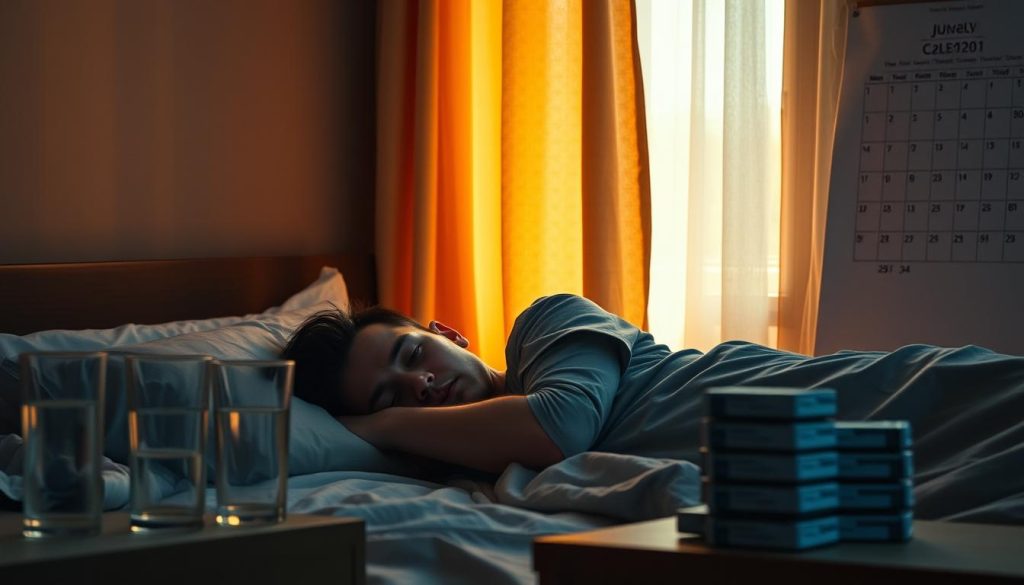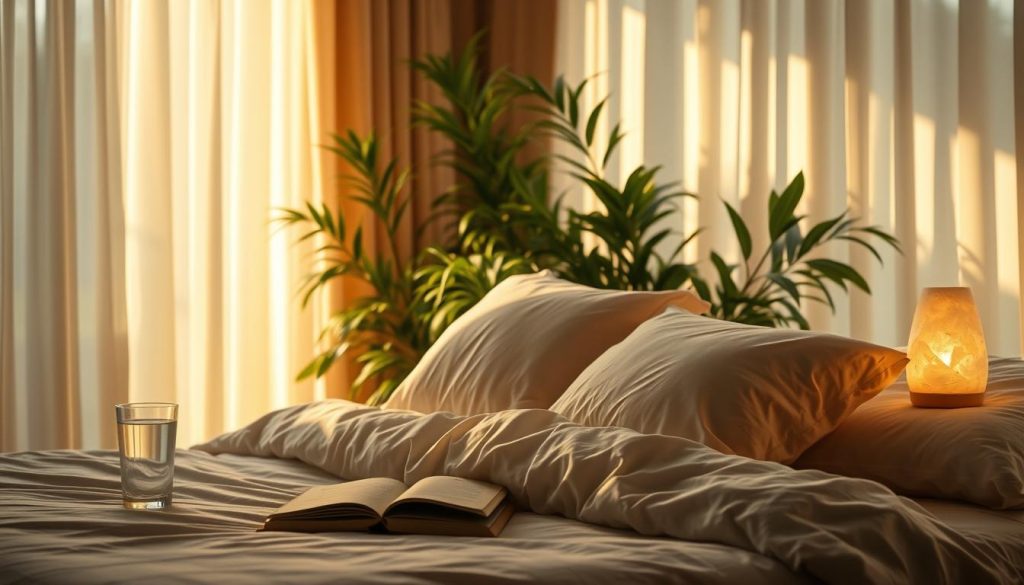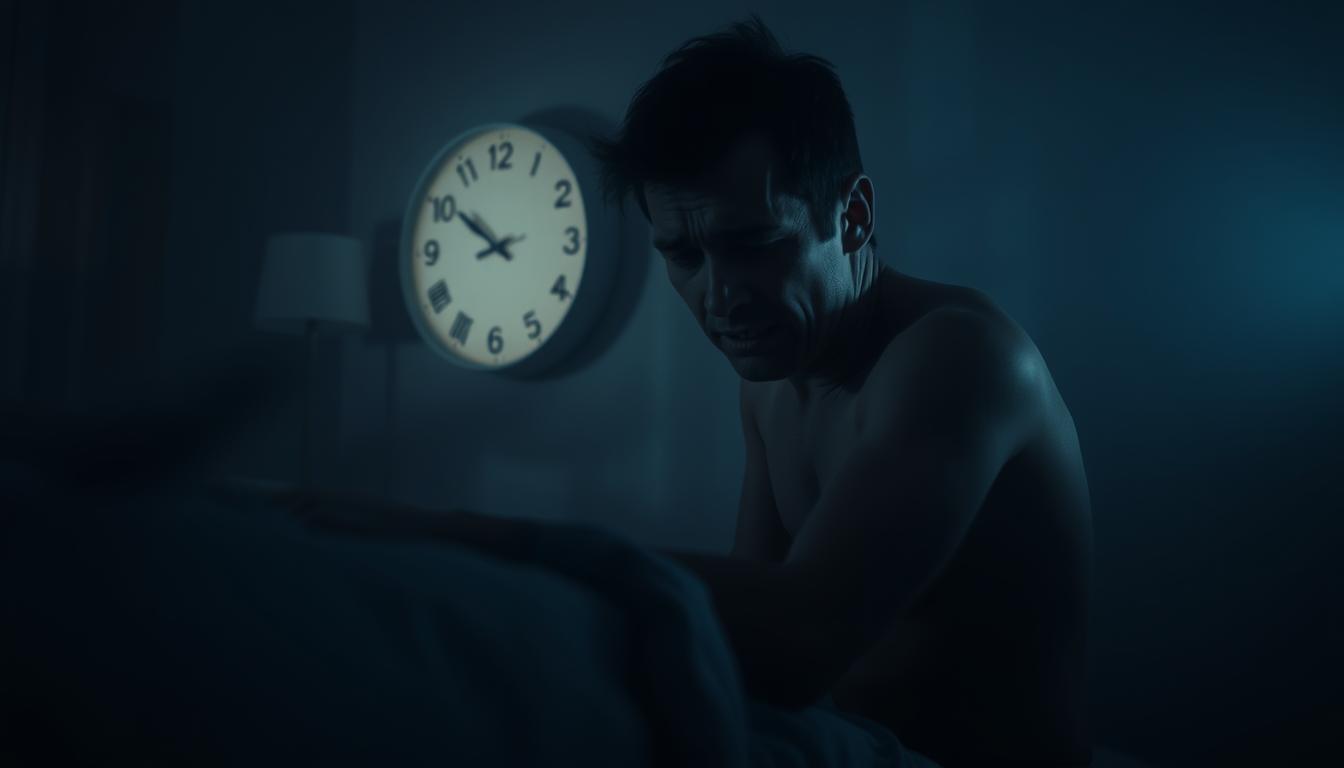Circadian rhythm sleep disorders affect how we sleep. They mess with our internal clock and the outside world’s rhythm. This makes it hard to start and keep sleeping.
Learning about these disorders can help us manage our sleep better. It’s a step towards better health and feeling more awake during the day. This includes dealing with insomnia and feeling tired when we shouldn’t be.
Understanding Circadian Rhythm and Its Importance
The circadian rhythm is a natural process that controls our sleep and wake times. It repeats every 24 hours. It’s influenced by light and darkness, making it key for our daily routines.
What is Circadian Rhythm?
Circadian rhythm is our body’s internal clock. It manages our sleep-wake cycle and other important activities. This includes hormone releases, body temperature, and metabolism. It helps our body work best during the day, keeping us healthy.
The Role of the Sleep-Wake Cycle
The sleep-wake cycle is a big part of our circadian rhythm. It tells us when to be awake and when to sleep. Keeping this cycle right is important for good sleep and being productive during the day. Problems can cause sleep disorders and hurt our daily work.
Impact on Overall Health
A good circadian rhythm is essential for health. It affects many body functions, like digestion, immune response, and mental health. Ignoring these rhythms can lead to serious health issues. This includes obesity, diabetes, and depression.
Common Circadian Rhythm Sleep Disorders
Learning about different circadian rhythm sleep disorders helps us understand their challenges and solutions. We’ll look at four common types, each with its own traits and effects.
Delayed Sleep Phase Syndrome
Delayed Sleep Phase Syndrome (DSPS) makes it hard to fall asleep and wake up on time. People with DSPS usually sleep late and wake up late. This can make it tough to keep up with schedules.
Advanced Sleep Phase Syndrome
Advanced Sleep Phase Syndrome (ASPS) is the opposite. People with ASPS sleep early and wake up early. This can mess up plans and make waking up feel like it’s not their choice.
Non-24-Hour Sleep-Wake Disorder
Non-24-Hour Sleep-Wake Disorder affects the body’s internal clock. It’s common in blind people because they can’t adjust to day and night. This leads to trouble sleeping and feeling tired during the day.
Jet Lag
Jet Lag happens when you travel quickly across time zones. It messes with your body’s clock, causing sleep problems and feeling tired. How bad it is depends on how many time zones you cross and in which direction. Adjusting quickly and using light can help fight jet lag.
Symptoms of Circadian Rhythm Sleep Disorders
Circadian rhythm sleep disorders mess with our natural sleep timing. This leads to symptoms that affect our daily lives. Knowing these symptoms helps us identify and manage these disorders better.
Insomnia and Difficulty Falling Asleep
Insomnia is a common symptom. People struggle to fall asleep at the usual times. This makes it hard to sleep at night.
Excessive Daytime Sleepiness
These disorders also cause too much daytime sleepiness. People might feel very tired or sleepy during the day. This can make it hard to do daily tasks.

Irregular Sleep Patterns
Irregular sleep patterns are another symptom. This can make daily activities harder and lower our quality of life. It’s important to manage and identify these symptoms to tackle circadian rhythm sleep disorders.
Causes and Risk Factors
Circadian rhythm sleep disorders come from a mix of genetic and lifestyle factors. Some people might be more likely to get these disorders because of their genes. Lifestyle choices like too much screen time before bed and irregular work hours also play a big role.
Environmental factors are also key. Being exposed to weird lighting, especially not enough natural light and too much artificial light at night, messes with our body’s clock. This can lead to sleep disorders and make them worse.
It’s important to know what causes these disorders to prevent and manage them better. These causes include genetics, how we behave, and our environment. By understanding and tackling these factors, we can lessen the effects of sleep disorders on our lives.
| Category | Contributing Factors |
|---|---|
| Genetic | Inherited predispositions |
| Behavioral | Excessive screen time, shift work |
| Environmental | Irregular lighting conditions |
How to Diagnose Circadian Rhythm Sleep Disorders
Getting a correct diagnosis for circadian rhythm sleep disorders is key to treating them well. This involves detailed checks that look into sleep patterns, daily habits, and what might be causing the problem. Here are the main ways doctors figure out these disorders.
Medical Evaluations
Medical checks are very important in diagnosing these sleep disorders. Doctors start by looking at the patient’s medical history to rule out other sleep issues. They ask about sleep habits, health, and lifestyle factors that might affect sleep.
Sleep Diaries and Questionnaires
Sleep diaries and questionnaires are crucial for diagnosing these disorders. Patients keep a record of their sleep and wake times for weeks. This helps doctors spot patterns and problems. Questionnaires give more details, showing habits and symptoms that might be causing sleep issues.
Polysomnography
Polysomnography is a detailed sleep study done overnight. It tracks sleep cycles and body functions like brain waves and heart rate. This test helps doctors understand sleep better and rule out other sleep problems.
Home Remedies and Lifestyle Changes
Fixing sleep issues often starts with home remedies and lifestyle changes. We’ll look at important steps to help you sleep better.
Maintaining a Consistent Sleep Schedule
Keeping a regular sleep schedule is key. Going to bed and waking up at the same time every day helps your body get into a rhythm. This can make your sleep better and improve your health.
Optimizing Your Sleep Environment
Having a great sleep environment is vital for good sleep. Make sure your bedroom is dark, quiet, and cool. A comfy mattress and pillows can also help you sleep better.
Avoiding Stimulants and Alcohol
Staying away from caffeine and nicotine before bed is important. Alcohol might help you relax but can mess with your sleep. By avoiding these, you can sleep better.
These home remedies and lifestyle changes can lead to better sleep. You’ll wake up feeling healthier and more alert.
Medical Treatments and Therapies
People with circadian rhythm sleep disorders have many treatment options. Light therapy, melatonin supplements, and chronotherapy are among the most effective. These methods help regulate sleep-wake cycles.
Light Therapy
Light therapy uses artificial light to reset the body’s clock. It’s great for those who struggle to wake up or have seasonal affective disorder. A lightbox mimics natural sunlight, telling the brain it’s time to wake up.
Melatonin Supplements
Melatonin supplements help manage sleep disorders. Melatonin is a hormone that regulates sleep. Taking these supplements at the right time helps the body sleep better and more regularly. They’re especially useful for jet lag or delayed sleep phase syndrome.
Chronotherapy
Chronotherapy adjusts sleep times to match the desired schedule. It gradually shifts the body’s clock, whether earlier or later. Combined with light therapy and melatonin, it can manage circadian rhythm sleep disorders well.
Impact on Mental Health
Circadian rhythm sleep disorders affect not just sleep but also mental health. People with these disorders often face mood issues like anxiety and depression. The irregular sleep patterns mess with the body’s internal clock, causing mental health problems.
It’s key to understand and tackle circadian rhythm sleep disorders for mental health. These disorders can worsen or cause mental health issues. So, it’s vital to fix sleep patterns early on.
Managing sleep disorders can involve lifestyle changes, therapy, and sometimes medicine. These steps help improve mental health. Recognizing the link between sleep and mood disorders is crucial for better care.
By being proactive and sticking to routines, we can reduce the negative effects on mental health. This leads to a better quality of life for everyone.
Managing Circadian Rhythm Sleep Disorders in Shift Workers
Shift workers have unique challenges with their sleep. They often struggle with sleep patterns and staying alert during the day. It’s important to find good sleep strategies to improve their well-being and work performance.

Strategies for Night Shift Workers
For those working at night, bright light helps keep them alert. It tells the brain to stay awake. Also, a dark, quiet sleep space at home helps with daytime sleep.
- Use blackout curtains to block daylight.
- Employ white noise machines or earplugs to minimize disturbances.
- Maintain a consistent sleep schedule, even on days off.
Tips for Rotating Shifts
Adjusting to rotating shifts requires a gradual change in sleep times. Using light and other strategies helps adapt to new work hours.
- Gradually shift your bedtime earlier or later, depending on the upcoming shift.
- Increase exposure to natural light during the day and avoid bright lights in the evening.
- Incorporate short naps if needed to reduce sleep deficit.
Good management of shift work and sleep strategies can greatly improve shift workers’ lives. By focusing on sleep hygiene and using these methods, they can lessen the negative effects of irregular sleep.
Traveling and Managing Jet Lag
Managing jet lag can make your trip better. It’s all about planning and using strategies before, during, and after your trip.
Pre-Travel Adjustments
Getting ready for your trip is key to beating jet lag. Start adjusting your sleep schedule a few days early. This helps your body adjust faster.
Also, make sure you’re well-rested before you leave. Trying to “bank” sleep can really help.
During Travel Tips
Stay active, drink water, and stay comfortable while traveling. Get up and move around to avoid stiffness. Drinking water and avoiding too much caffeine or alcohol helps keep you hydrated.
Change your watch to the destination’s time zone as soon as you get on the plane. This helps your mind adjust faster.
Post-Travel Recovery
When you arrive, try to do things at the local time. This helps you recover from jet lag faster. Get some natural light to help your body clock adjust.
Do some light exercise and eat well to help your body recover. Short naps can help fight off tiredness without messing up your new sleep schedule.
Here’s a quick comparison of actionable tips for managing jet lag:
| Phase | Action |
|---|---|
| Pre-Travel | Adjust sleep schedule, get well-rested |
| During Travel | Stay hydrated, move around, set your watch |
| Post-Travel | Seek natural light, engage in physical activity |
Managing jet lag well means you can enjoy your trip fully. You’ll have energy and excitement from the start.
Children and Circadian Rhythm Sleep Disorders
Circadian rhythm sleep disorders affect kids too, especially as they grow into teens. These issues can hurt their school work and behavior. So, it’s key to catch them early.
Getting kids to sleep on a regular schedule is vital. Doctors say it’s important to keep bedtime and wake-up times the same every day. This helps their body clocks work better.
Looking at what affects their sleep is also important. Too much light before bed can mess with their sleep patterns. Keeping screens away and making their bedroom dark and cool helps. Also, playing outside during the day helps their body clocks stay in sync.
It’s important to act fast if you notice sleep problems in your child. Talking to a doctor can help find the right solutions. They might use sleep diaries and questionnaires to help.
Understanding and treating sleep disorders early can help kids navigate adolescence better. It can lead to a healthier and happier path for them.
Long-Term Strategies for Better Sleep
Improving sleep over time is crucial for managing sleep disorders. By adopting healthy sleep habits, staying active, and practicing mindfulness, you can greatly improve your sleep. This can also boost your overall well-being.
Establishing Healthy Sleep Habits
Starting with healthy sleep habits is key to better sleep. Being consistent with your sleep schedule helps your body’s internal clock. A calming pre-sleep routine, like reading or a warm bath, signals it’s time to relax.

Regular Physical Activity
Regular exercise can greatly improve your sleep. Activities like walking, swimming, or yoga during the day help tire your body. This makes it easier to fall and stay asleep. But, avoid intense workouts before bed as they can keep you awake.
Mindfulness and Relaxation Techniques
Mindfulness and relaxation techniques are great for managing stress and improving sleep. Practices like meditation, deep breathing, and muscle relaxation calm your mind and body. They help you sleep better. These techniques can also reduce stress and improve your mental health throughout the day.
| Strategy | Benefits |
|---|---|
| Healthy Sleep Habits | Regulates internal clock, improves sleep onset |
| Physical Activity | Enhances sleep quality, promotes physical health |
| Mindfulness Techniques | Reduces stress, aids in sleep transition |
When to Seek Professional Help
Many sleep disorders can be managed with lifestyle changes and home remedies. But, if symptoms don’t go away, it’s time to seek professional help. Ignoring sleep issues can harm your health and quality of life.
If you can’t sleep well despite trying, it’s time to see a sleep specialist. They can create a treatment plan just for you. This might include light therapy or chronotherapy, which need a professional’s guidance.
A sleep specialist can do detailed assessments, like sleep studies and medical checks. This ensures you get the right diagnosis and treatment. Early help from healthcare professionals is key to avoid long-term problems.
By getting professional help, you can improve your sleep and overall health. Don’t ignore sleep problems. See a sleep specialist if you have persistent or severe sleep issues.

